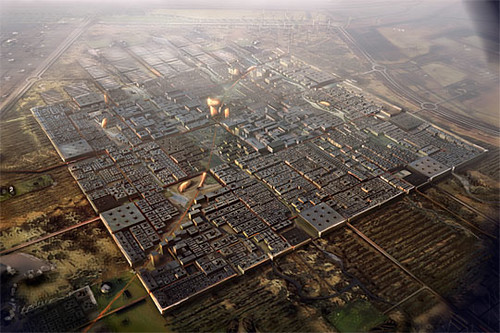Masdar: A Glimpse Of The Future
Posted by Big Gav in masdar
Plenty has a look at the planned middle eastern ecopolis of Masdar (which just bought into a Finnish company making low speed wind turbines) - Über green Masdar City the United Arab Emirates, a glimpse of the future.
Imagine a city whose residents have kicked the fossil fuel habit and rely solely on sun and wind for electricity. Cars are banished; instead, people walk, bicycle, and zip across town in underground, electric-powered pods.
If that sounds like science fiction, think again. In February, builders broke ground on Masdar City, a planned $22 billion zero-waste, zero-carbon community in the United Arab Emirates (UAE). Located on the shores of the Persian Gulf, the project is set to be completed in 2016. Abu Dhabi, capital of the UAE, is behind what is the world’s most ambitious “eco-city” project to date. Masdar’s 50,000 residents will push the boundaries of green living, starting with its first inhabitants, 100 alternative energy postgrads at the Masdar Institute of Science and Technology who will arrive in September 2009. Powered by renewable energy, the city will recycle all of its garbage and much of its water, and grow organic produce. “We’re simply taking a very bold step,” says Masdar chief executive Sultan Ahmed Al Jaber.
Masdar is one of several efforts to create sustainable communities in response to the threats posed by climate change. A low-carbon city is being built on Dongtan, an island off Shanghai, and Iceland, Norway, Costa Rica, and New Zealand have pledged to rid their economies of carbon. Masdar, however, is the most far-ranging development planned yet. It’s also the first undertaken by a major oil producer.
Oil has made Abu Dhabi fabulously wealthy—it holds nine percent of the world’s proven reserves. But that resource will run out. So the emirate is looking to cleantech industries to help wean it off its fossil fuel dependency and create new jobs. “If it’s a business someone is developing for 2015, we don’t want to be in it,” says Homaid Al Shemmari, associate director at Mubadala, a government-owned development company that oversees the project. “We’re looking way, way into the future.”
Planners are already integrating that kind of foresight into the fabric of the city. A canopy of thin-film solar panels will provide shade and half the city’s electricity. Wind turbines and waste-to-power plants, which use garbage as fuel, will dot the landscape. In the nearby desert, a 500-megawatt power plant will capture solar energy. Instead of photovoltaic panels, mirrors and lenses will concentrate the sun’s rays, utilizing heat to power steam generators. Hot water may come from “evacuated thermal tubes,” pipes filled with fluid and heated by sunlight; or from drilling thousands of feet underground to use the earth’s warmth to heat water.
Most of that water will come from desalination, an energy-intensive process in which seawater is converted to fresh water. Desalination provides most of UAE’s water supply, which helps explain why the country has the highest per capita carbon footprint in the world. But in Masdar, solar energy will power desalination. Conservation efforts are also part of the program: Recycling 80 percent of water and employing technologies like a leak-detection system are important steps for meeting the goal of 21 gallons of water per person daily (the national average is currently 143).
Perhaps the biggest experiment of all is the plan to make Masdar car-free. Planners hope shaded alleyways will encourage city dwellers to travel on foot. Residents will also get around by electric-powered light rail, and “personal rapid transit systems”— six-passenger, electric-powered pods that will run underground and deliver riders to roughly 1,500 stations throughout the city.






